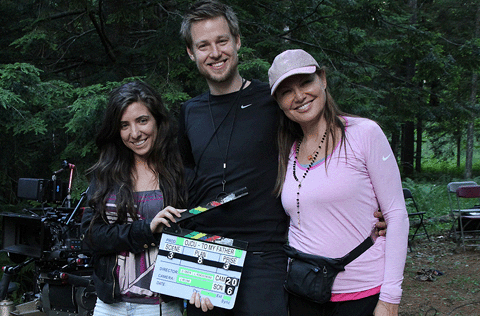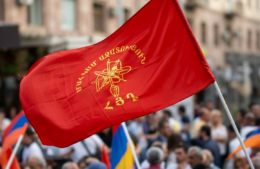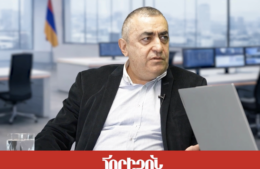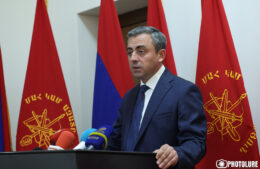Another Untold Genocide: Reopening pages of untold Polish history
- (0)
Another Untold Genocide. Reopening pages of untold Polish history –
By Diana Skaya
This year, one of the most unexpected and biggest revolutions took place in Ukraine.
Armenians have been present in the west-central and south-western parts of present-day Ukraine, in the historic region of Podolia since the early 1340s. Armenian artists, writers, historians, teachers, jewellers, architects have helped Polish Kings build and expand these former Polish lands, especially the cities of Lviv, Kamenetz-Podolsk, and Vinnitsya.
Seeing Ukraine fall apart saddens me because 75 years ago, it is the country where both my Armenian and Polish roots were first planted. It is the land of both my Armenian and Polish ancestors. Sadly, one of them, my Polish grandfather Adam Bandrowski, whose paternal grandmother Victoria Melik Pashamian was purely Armenian, had his life taken away in the little known Vinnitsya massacre. He was 29 years old.
During Stalin’s Great Purge between 1937 and 1939, gangs of the Soviet Secret Police, the NKVD stormed through the villages and towns of Podolia, arresting innocent Poles, Ukrainians, and other ethnic minorities of which most were Armenian, falsely accusing them of being the “true enemies of the state.” 20,000 were arrested in Vinnitsya alone, and sent to the NKVD prison there, where they were denied the right to correspond with their families. Of those, 13 475 were executed in a typical Soviet manner – with a bullet to the head – and buried secretly during the night in mass graves in Vinnitsya’s Gorky Park .
Today, the Vinnitsya genocide remains a tragedy that has been left unspoken of– until the day I realized that I will be the first one to bring this story to life on screen.
It all started a few years ago when I came across a six page poem that my aunt Alina, Adam’s daughter, currently residing in Montreal, had written about her father in Polish. She was 3 years old the night the Soviet officers barged into her house and took him away…
Each poetic verse had made an unexplainable impact on me. Each word I read, suddenly had me envisioning non stop moving images in my mind. I started remembering and picturing my mother’s and grandmother’s horrific tales of the Soviet years under Stalin’s regime. Right there and then I knew that I would be taking on the biggest challenge of my life so far, and make a movie out of this poem that I was holding in my hands.
I knew that there was only one place in the world where I would be able to gather my thoughts properly and begin writing the script entitled Ojcu, Polish for To My Father. And so, back home to Yerevan I flew, where I stayed for 6 months writing, researching, and constantly communicating with my mother back in Montreal, for more stories, more facts, more dates; anything that would bring as much accuracy and verbatim dialogue to the script as possible, and this in three languages; Polish, Ukrainian and Russian. Half a year later, in mid 2012, I presented the project to the Consul General of the Republic of Poland in Montreal, Andrzej Szydlo, hoping to get the Polish government’s support to push the film project forward. He became an incredible mentor to me, and within a year, I was introduced to remarkable people and organizations who believed in the importance of bringing this part of untold history to life, and who all wanted to contribute to its creation. Eventually, I was thrilled on the news that I had finally received the official support and funding from the Ministry of Foreign Affairs of Poland.
Along my path, I found it a mere coincidence that each person involved in this Polish film, had some sort of personal connection with Armenia or Armenians. First and foremost, it never crossed my mind that one of my best childhood friends, still back from our Armenian kindergarden school years here in Montreal, Christopher Cioffi, surprised me when he offered his help and partnership in order to produce this film.
Another producer from the Chelminski Family Foundation, always spoke proudly of his closest Armenian friend, and has been planning a trip to Yerevan with him.
I will also never forget the shocked look on my face when I heard Polish Consul Generals in Ukraine, who helped me obtain my grandfather’s entire NKVD dossier from the city of Vinnytsia’s archives last year, suddenly begun reminiscing about their best memories of Armenia, and how no other country in the world had treated them with such hospitality, incredible food and had the world’s best cognac, let alone how one of them simply began speaking to me in an almost fluent Armenian!
Best of all, throughout my journey to make this film happen, I turned to the support of the Liliana Komorowska Foundation for the Arts, a Polish artistic foundation based in Montreal. Little did I know that Liliana Komorowska herself, award winning documentary filmmaker who first began her acting career in Poland in the 70s and played a lead role in reknown Polish film director of Armenian descent Jerzy Kawalerowicz’s film, shared my vision and would not only help re-write the script, but also produce and direct the movie with me.
And so, at the turn of June and July 2014, another childhood friend and co-producer’s two typically old fashioned Polish chalets in Rawdon became our little town of Vinnytsia, and the Polish Consulate’s basement turned into the NKVD prison and headquarters.
Liliana and I had assembled a professional and incredible film crew and cast, and friends and family within the Montreal Polish community volunteered long 12-15 hour days and nights to complete our first stage of production.
With my family’s help, as many artefacts as possible were used in order to recreate 1938, including Adam Bandrowski’s personal documents, identification papers, actual bed sheets, curtains, clothes, diaries, books, crosses and bibles that my grandmother hid and preserved her whole life, and of course Adam’s NKVD arrest and execution order papers that I myself brought back to Montreal.
The film, revealed through the art of poetry, depicts the life of Adam Bandrowski, and tells the story of the tragic Vinnitsya massacre from his daughter Alina’s perspective.
The film consists of Polish, Russian, Ukrainian actors. Armenian actor Kevork Arslanian, who had a part in Atom Egoyan’s Ararat, plays one of the NKVD officers.
Mark Antony Krupa (Sum of all Fears, Human Trafficking, White House Down,) also stars, and was consultant producer.
Director of photography was Jan Belina Brzozowski, graduate of Europe’s best film school in Lodz, Poland and former student of Witold Sobocinski and Oscar nominee Polish cinematographer Slawomir Idziak (Black Hawk Down).
New York based Polish actor Antoni Porowski (The Blacklist, Boardwalk Empire) took on the role of Adam Bandrowski. Newcomer Olesya Akhtemiychuk plays Adam’s wife and Alina’s mother, and three year old Maila Desrochers stars as the young Alina.
A few weeks after the filming was complete, I somehow discovered that my grandfather had family members, under the same family name, living in Ottawa. I was more than excited to meet them for the first time and tell them about the movie, only to discover that their main deepest desire was to learn about their long lost Armenian heritage.
This journey has been an extraordinary adventure of self- discovery for me, and has connected me even closer to two rich cultures, two rich nations that have such strong history, that have always risen after massive falls and will always stand strong, two cultures that I take pride in calling my own; Polish and Armenian.
To My Father is currently in post-production and due to premiere in 2015.
Horizon Weekly
2014 Special Issue




















